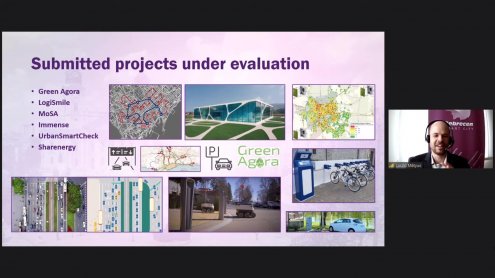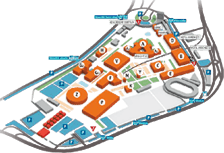URBIS SERVICES: Sustainable Mobility, Decarbonisation and Energy Communities
The URBIS SMART CITY FAIR 2021 conference also
featured the URBIS SERVICES block, focusing on accessible and high-quality
services. László Mátyus z EDC
Debrecen Urban and Economic Development Centre spoke about smart solutions in the second
largest Hungarian city of Debrecen, discussing
above all sustainable mobility.
The city's key goals include reducing time spent on transport, raising
awareness about sustainable transport and reducing traffic-related pollution.
Some international projects focusing on sustainable mobility were also
presented, such as the Urbact Thriving Streets project, in which 10 cities from
the European Union are involved. They are trying to identify areas where
vehicle access can be restricted and the proportion of pedestrian zones can be
extended. Another project is DebrecenMob, motivating residents to travel
sustainably. More than 30 companies and their employees participated in the
call. It resulted in more than one thousand active participants and over 100
thousand sustainable kilometres.
Lukáš Hataš from the Association for Electromobility focused on the climate commitment and decarbonisation. In the Czech Republic, for example, this commitment was undertaken by the capital city of Prague, which has committed itself to reducing its emissions by 45% by 2030. The municipality in particular can influence the level of decarbonisation in a given area and become the driver of change. For example, the increasing economic efficiency of electromobility with regard to the growing taxation of emission sources was also mentioned.
Aneta Zachová, editor-in-chief of the Euractiv.cz server, which focuses on the European Union, European policies and their impact on the Czech Republic, focused on the energy communities. Energy communities in particular can make an appropriate contribution to the transformation of European energy policy. Thanks to their own renewable sources, citizens or municipalities themselves can become energy producers and thus remain independent of large energy suppliers. In 2016, the European Commission incorporated this idea into its legislation through a package called Clean Energy for All Europeans. It requires Member States to strive for the decentralization of energy and enable citizens to develop the use of renewable resources. Hence, people are no longer mere consumers of energy, but become its producers. According to the CE Delft study, up to 264 million Europeans could be involved in energy production by 2050. Should this really happen, they could cover up to 55% of electrical power consumption in the European Union.







